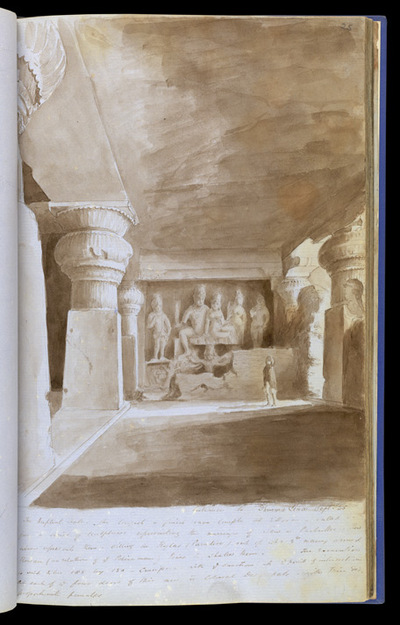Javascript must be enabled to continue!
f.25 Dumar Lena Cave with sculpture of Ravana rocking Mount Kailasa, Cave 29, Ellora. 'Entrance to Dhurma Lena. Septr. 25.'
View through Europeana Collections
Wash and watercolour drawing of the sculpture of
Ravana shaking Mount Kailasa from Dhumar Lena, Cave 29 at Ellora,
from an Album of 83 drawings; 80 of landscapes and antiquities in
the northem Deccan, 2 portraits and 1 flower study made during a
tour chiefly to Ellora, Rauza, Daulatabad, Aurangabad and Ajanta.
September to November 1849. Although the artist is unidentified,
these drawings are of some interest since they show the state of
the Ajanta and Ellora Caves soon after the Royal Asiatic Society
had brought them to the Company's notice in 1844. Robert Gill had
been deputed to make a record of Ajanta in 1846 and was presumably
on the spot when these sketches were made.The spectacular site of
Ellora, in Maharashtra, is famous for its series of Buddhist, Hindu
and Jain cave temples excavated into the rocky façade of a cliff
of basalt along more than 2 km. The works were done under the
patronage of the Kalachuri, the Chalukya and the Rashtrakuta
dynasties between the sixth and the ninth centuries. Dhumar Lena is
one of the earliest caves of the Hindu series and dates from the
Kalachuri period, early 6th century, as denoted by the similarity
between its columns and those at the Elephanta cave. Large-scale
sculpted wall panels on the sides represent Shaivite myths. The
sculpture depicted in this drawing represents Ravana shaking the
abode of Shiva and Parvati in the Himalayas.
Title: f.25 Dumar Lena Cave with sculpture of Ravana rocking Mount
Kailasa, Cave 29, Ellora. 'Entrance to Dhurma Lena. Septr.
25.'
Description:
Wash and watercolour drawing of the sculpture of
Ravana shaking Mount Kailasa from Dhumar Lena, Cave 29 at Ellora,
from an Album of 83 drawings; 80 of landscapes and antiquities in
the northem Deccan, 2 portraits and 1 flower study made during a
tour chiefly to Ellora, Rauza, Daulatabad, Aurangabad and Ajanta.
September to November 1849.
Although the artist is unidentified,
these drawings are of some interest since they show the state of
the Ajanta and Ellora Caves soon after the Royal Asiatic Society
had brought them to the Company's notice in 1844.
Robert Gill had
been deputed to make a record of Ajanta in 1846 and was presumably
on the spot when these sketches were made.
The spectacular site of
Ellora, in Maharashtra, is famous for its series of Buddhist, Hindu
and Jain cave temples excavated into the rocky façade of a cliff
of basalt along more than 2 km.
The works were done under the
patronage of the Kalachuri, the Chalukya and the Rashtrakuta
dynasties between the sixth and the ninth centuries.
Dhumar Lena is
one of the earliest caves of the Hindu series and dates from the
Kalachuri period, early 6th century, as denoted by the similarity
between its columns and those at the Elephanta cave.
Large-scale
sculpted wall panels on the sides represent Shaivite myths.
The
sculpture depicted in this drawing represents Ravana shaking the
abode of Shiva and Parvati in the Himalayas.
Related Results
f.28 Entrance to Dumar Lena Cave with sculpture of Siva's
Dance in the Elephant Skin, Cave 29, Ellora. 'Dhurma Lena. 26
Sept.'
f.28 Entrance to Dumar Lena Cave with sculpture of Siva's
Dance in the Elephant Skin, Cave 29, Ellora. 'Dhurma Lena. 26
Sept.'
Wash and watercolour drawing of the Dhumar Lena,
Cave 29 at Ellora, from an Album of 83 drawings; 80 of landscapes
and antiquities in the northem Deccan, 2 portraits and 1 flower
s...
Ravana's Abduction of Sita, folio from a Ramayana Series
Ravana's Abduction of Sita, folio from a Ramayana Series
The painting represents a scene from the Sanskrit epic, the Ramayana (Story of Rama). Ravana, the demon king of Lanka, wants to abduct Sita, the wife of Rama, who is the seventh av...
Inscribed on reverse: 'Tin Tal Cave Ellora. March
1847'
Inscribed on reverse: 'Tin Tal Cave Ellora. March
1847'
Water-colour by Charles Power Cobbe of the Tin
Tal Cave at Ellora, dated March 1847. Inscribed on reverse: 'Tin
Tal Cave Ellora. March 1847 CPC'.Charles Power Cobbe was in the 8th
...
Entrance to the cave temple of Karle. Copy of an original
sketch of 1805
Entrance to the cave temple of Karle. Copy of an original
sketch of 1805
Water-colour by James Broff Byers of the entrance
to the cave temple of Karle, dated 1815. Inscribed on reverse:
'View of the Entrance, or External Appearance of the magnificent
Ca...
Standing Buddha Shakyamuni in Varada-mudra
Standing Buddha Shakyamuni in Varada-mudra
This sculpture depicts a Buddha gracefully standing on a shallow lotus pedestal, the Buddha likely the Buddha Sakyamuni (the Historical Buddha) though possibly the Buddha Dipankara...
Cave 2, Entrance to Cell at Right Hand End of Porch
Cave 2, Entrance to Cell at Right Hand End of Porch
Pencil drawing of the entrance to the cell at the
right hand end of the porch of Cave 2 at Ajanta, from an Album of
26 ground plans of the Ajanta caves and 16 folios of drawings of...
Cave 1, Details of Pillars f.30
Cave 1, Details of Pillars f.30
Pencil drawing of pillars from Cave 1 at Ajanta,
from an Album of 26 ground plans of the Ajanta caves and 16 folios
of drawings of sculpture and architectural details in the Ajanta...
Cave 1, Details of Pillars f.33
Cave 1, Details of Pillars f.33
Pencil drawing of pillars and pilasters from Cave
1 at Ajanta, from an Album of 26 ground plans of the Ajanta caves
and 16 folios of drawings of sculpture and architectural details...



